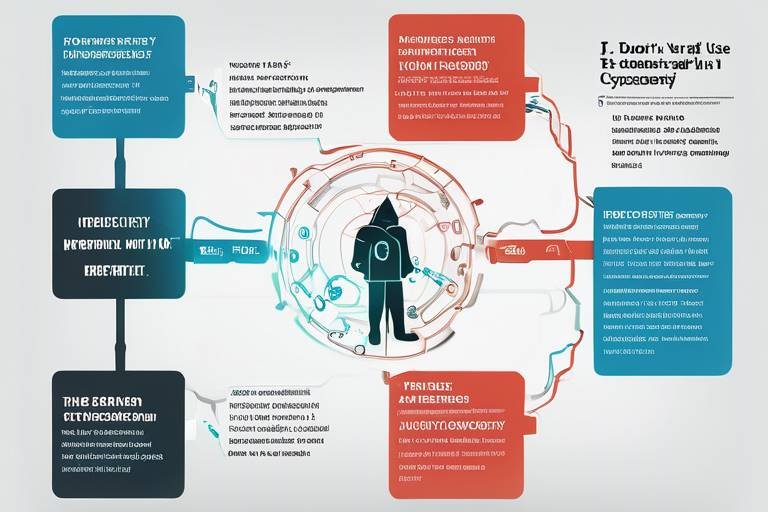The Increasing Role of Cyber Insurance in Business
The digital age has brought about an incredible transformation in how businesses operate, communicate, and protect their assets. However, with great innovation comes great risk. As cyber threats become more sophisticated, the landscape of business security is changing dramatically. This article explores the growing importance of cyber insurance for businesses, examining its benefits, challenges, and the evolving landscape of cybersecurity threats that necessitate such coverage.
In today's world, where data breaches and cyberattacks are becoming alarmingly common, businesses face significant risks that can jeopardize their financial stability and reputation. Cyber insurance serves as a crucial safety net, helping organizations mitigate financial losses and recover from data breaches and other cyber incidents. Imagine investing in a state-of-the-art security system for your home; cyber insurance is akin to that investment for your business, providing peace of mind in the face of potential threats.
Understanding the different types of cyber insurance policies available is essential for businesses looking to safeguard their operations. These policies vary in coverage, catering to diverse organizational needs. For instance, some policies focus on data breaches, while others emphasize business interruption or liability. It's crucial for businesses to match their specific requirements with the right type of coverage.
Each cyber insurance policy has specific coverage details that outline what incidents are included. Businesses must carefully review these details to ensure they are adequately protected against potential cyber risks. For example, a policy might cover the costs associated with a data breach, providing funds for notification, legal fees, and even credit monitoring for affected individuals. Without a thorough understanding of these details, businesses could find themselves underinsured in the event of an incident.
Data breach coverage is a critical component of cyber insurance, addressing the costs associated with data loss. This includes not only the immediate financial impact but also the long-term repercussions, such as damage to customer trust and brand reputation. In an era where data is often referred to as the "new oil," protecting it is paramount. Companies must ensure they have robust data breach coverage to navigate the complex aftermath of a cyber incident.
Business interruption coverage helps organizations recover lost income due to cyber incidents that disrupt operations. Picture a scenario where a ransomware attack locks your systems and halts production. This coverage ensures financial stability during challenging times, allowing businesses to focus on recovery rather than worrying about cash flow. It's a lifeline that can mean the difference between survival and closure for many companies.
Cyber insurance policies often include liability coverage for third-party claims, which is essential for businesses that handle sensitive customer information. Additionally, compliance with regulations is becoming increasingly important, as failure to meet these standards can lead to hefty fines. Understanding these obligations and potential liabilities is crucial for businesses to protect themselves comprehensively.
Before purchasing cyber insurance, businesses must conduct a thorough evaluation of their cyber risk exposure. This assessment helps determine the appropriate level of coverage needed to protect against potential threats. It's akin to getting a health check-up before deciding on a health insurance plan; understanding your vulnerabilities is key to making informed decisions.
Utilizing risk assessment tools allows organizations to identify vulnerabilities in their systems, providing valuable insights into the types of coverage that would best suit their needs. These tools can highlight areas of weakness, enabling businesses to proactively address potential threats before they escalate into full-blown crises.
Engaging cybersecurity experts can enhance risk evaluation processes, ensuring that businesses have a comprehensive understanding of their cyber landscape. These professionals can provide tailored recommendations, guiding organizations in selecting the right cyber insurance policies that align with their unique risk profiles.
The cyber insurance market is evolving rapidly, driven by increasing cyber threats and regulatory changes. Understanding future trends is vital for businesses to stay ahead and secure adequate protection. As technology advances, so too do the tactics employed by cybercriminals, making it essential for businesses to remain vigilant.
Emerging trends in cyber insurance include the integration of advanced technologies and data analytics. These innovations can help insurers better assess risks and tailor policies to individual business needs. Just as businesses adapt to new technologies, so must the insurance industry evolve to meet the demands of a changing cyber landscape.
Regulatory changes are influencing cyber insurance coverage requirements, compelling businesses to adapt their policies to comply with new laws and standards. This shift ultimately enhances their cybersecurity posture, ensuring they are not only protected but also compliant with legal obligations.
- What is cyber insurance? Cyber insurance is a type of insurance designed to protect businesses from financial losses resulting from cyber incidents, such as data breaches and cyberattacks.
- Why do businesses need cyber insurance? With the increasing frequency and sophistication of cyber threats, cyber insurance provides a safety net that helps mitigate financial losses and supports recovery efforts.
- What does a typical cyber insurance policy cover? Coverage can vary widely but often includes data breach costs, business interruption losses, liability for third-party claims, and compliance with regulations.
- How can businesses assess their cyber risk? Businesses can evaluate their cyber risk by utilizing risk assessment tools and engaging cybersecurity experts to identify vulnerabilities and appropriate coverage levels.

The Necessity of Cyber Insurance
As we navigate our increasingly digital world, the importance of cyber insurance cannot be overstated. With cyber threats evolving at a breakneck pace, businesses of all sizes are finding themselves vulnerable to attacks that can lead to devastating financial losses. Imagine waking up to discover that your company’s sensitive data has been compromised. The thought alone can send shivers down your spine, right? This is where cyber insurance steps in as a vital safety net.
Cyber insurance serves as a crucial shield, helping organizations mitigate the fallout from data breaches, ransomware attacks, and other cyber incidents. It’s not just about recovering from an attack; it’s about ensuring that your business can continue to operate without facing crippling financial repercussions. In fact, studies show that businesses without cyber insurance are significantly more likely to face bankruptcy following a major cyber incident. This stark reality highlights why every business should consider investing in a comprehensive cyber insurance policy.
But what exactly does cyber insurance cover? Generally, it provides financial protection against a variety of risks associated with cyber threats. This includes expenses related to data breaches, such as:
- Notification costs for affected individuals
- Legal fees and regulatory fines
- Credit monitoring services for victims
- Business interruption losses
These costs can add up quickly, often reaching into the millions for larger organizations. Without insurance, businesses may struggle to recover, leading to long-term operational and reputational damage.
Moreover, the landscape of cyber threats is constantly changing. From phishing attacks to sophisticated malware, the methods used by cybercriminals are becoming more advanced. As a result, companies must stay vigilant and proactive about their cybersecurity measures. Cyber insurance not only provides financial support but also encourages businesses to adopt better security practices. Insurers often require policyholders to implement certain cybersecurity measures, which can help organizations bolster their defenses against potential attacks.
In summary, the necessity of cyber insurance is clear. It is not merely an optional add-on but a critical component of a comprehensive risk management strategy. By investing in cyber insurance, businesses can protect themselves from the ever-present threat of cyberattacks, ensuring their longevity and stability in an unpredictable digital landscape.
Q: What types of businesses need cyber insurance?
A: Any business that handles sensitive data, including customer information, financial records, or proprietary information, should consider cyber insurance. This includes not only large corporations but also small and medium-sized enterprises.
Q: How much does cyber insurance cost?
A: The cost of cyber insurance varies widely based on factors such as the size of the business, the level of coverage, and the industry in which the business operates. On average, businesses can expect to pay between $1,000 to $7,500 annually for coverage.
Q: Does cyber insurance cover all types of cyber incidents?
A: Not all policies cover every type of incident. Businesses should carefully review their policy details to understand what is covered and what exclusions may apply.
Q: How can a business assess its need for cyber insurance?
A: Conducting a thorough risk assessment can help businesses identify their vulnerabilities and determine the appropriate level of coverage needed. Engaging cybersecurity experts can also provide valuable insights into the specific risks faced by the organization.

As businesses navigate the digital landscape, understanding the types of cyber insurance policies available is essential for effective risk management. Just like a well-tailored suit, the right cyber insurance policy should fit the unique needs of your organization. With a variety of options on the market, selecting the appropriate coverage can feel overwhelming. However, breaking it down into key categories can simplify the decision-making process.
Cyber insurance policies generally fall into several categories, each designed to address different aspects of cyber risk. Here are the primary types:
- Data Breach Insurance: This policy covers the costs associated with data breaches, including legal fees, notification costs, and credit monitoring services for affected individuals. In today’s world, where data is often considered the new oil, protecting sensitive information is paramount.
- Business Interruption Insurance: When a cyber incident disrupts operations, this coverage helps businesses recover lost income. Think of it as a financial safety net that ensures your organization remains afloat during turbulent times.
- Cyber Liability Insurance: This type provides coverage against third-party claims resulting from data breaches or cyber incidents. It’s like having a shield that protects you from lawsuits and regulatory fines.
- Network Security Insurance: This policy covers losses resulting from security breaches, including hacking, denial-of-service attacks, and other malicious activities. With cybercriminals constantly evolving their tactics, this type of coverage is becoming increasingly critical.
Each of these policies can be tailored to meet the specific needs of a business, depending on its size, industry, and risk exposure. For instance, a small business may prioritize data breach insurance, while a larger corporation might require a comprehensive suite of policies to cover various cyber risks.
It's important to note that while having cyber insurance is a crucial step in protecting your business, it’s not a substitute for a robust cybersecurity strategy. Just like you wouldn’t drive a car without wearing a seatbelt, relying solely on insurance without implementing strong security measures can leave your organization vulnerable. Therefore, a holistic approach that combines insurance with proactive cybersecurity practices is essential for safeguarding your business.
In summary, understanding the different types of cyber insurance policies available can empower businesses to make informed decisions. By evaluating their unique needs and risks, organizations can select the right coverage that not only protects them from financial losses but also enhances their overall cybersecurity posture.

When it comes to cyber insurance, understanding the specific coverage details of each policy is paramount for any business. These policies are not one-size-fits-all; they are tailored to meet the unique needs and vulnerabilities of different organizations. A comprehensive policy can offer protection against a range of incidents, but it’s crucial to delve into the fine print to grasp what is actually covered.
Many policies typically include coverage for incidents such as data breaches, business interruption, and liability claims. However, the specifics can vary significantly from one insurer to another. For instance, a policy might cover the costs associated with notifying affected parties in the event of a data breach, but it might not cover the legal fees incurred if those parties decide to sue. This is why businesses must carefully review their options and consider what risks they are most exposed to.
To give you a clearer picture, here’s a breakdown of some common coverage areas:
| Coverage Type | Description |
|---|---|
| Data Breach Coverage | Covers costs related to data loss, including notification, legal fees, and credit monitoring for affected individuals. |
| Business Interruption Coverage | Provides compensation for lost income due to cyber incidents that disrupt business operations. |
| Cyber Liability Coverage | Protects against third-party claims arising from data breaches or cyber incidents. |
| Regulatory Fines and Penalties | Covers fines and penalties arising from non-compliance with data protection regulations. |
Each of these coverage types addresses specific risks that businesses face in an increasingly digital landscape. For example, data breach coverage is essential, as it can quickly become a financial burden if sensitive customer information is compromised. On the other hand, business interruption coverage ensures that a company can maintain its operations and financial stability even when faced with an unexpected cyber event.
Moreover, businesses should also be aware of the exclusions that may apply to their policies. Common exclusions might include incidents caused by employee negligence or failure to follow security protocols. Therefore, it’s advisable to engage with an insurance broker or a legal expert to fully understand the implications of these exclusions and ensure that the policy aligns with the organization’s risk management strategy.
In conclusion, the details of cyber insurance policies can be intricate and vary widely. By taking the time to thoroughly review policy coverage details, businesses can ensure they are adequately protected against the myriad of cyber risks that exist today.

In today’s digital landscape, where data is the new gold, the importance of data breach coverage cannot be overstated. A data breach can feel like a sudden storm, sweeping away not just sensitive information but also the trust of customers and stakeholders. Imagine waking up to find that your company's confidential data has been compromised. The implications can be staggering, with costs spiraling out of control. This is where data breach coverage steps in as a crucial component of cyber insurance, acting as a financial lifeline for businesses in distress.
Data breach coverage typically encompasses several key areas that help mitigate the fallout from such incidents. For instance, it often includes the costs associated with notification of affected individuals, which is not just a legal obligation but also a crucial step in maintaining transparency and trust. Legal fees, which can mount quickly in the wake of a breach, are also covered under this policy. Additionally, businesses may need to provide credit monitoring services for those impacted, ensuring that they can protect their identities post-breach. This comprehensive approach helps organizations not just recover but also rebuild their reputations.
Moreover, the coverage can extend to forensic investigation costs, which are essential for understanding the breach's origin and preventing future occurrences. This aspect of the coverage is akin to hiring a detective to uncover the mystery behind a crime scene. The insights gained from these investigations can be invaluable in fortifying defenses against future cyber threats.
To give you a clearer picture, here’s a brief overview of what data breach coverage typically includes:
| Coverage Area | Description |
|---|---|
| Notification Costs | Expenses related to informing affected individuals about the breach. |
| Legal Fees | Costs incurred for legal representation and advice. |
| Credit Monitoring | Services offered to affected individuals to monitor their credit for suspicious activity. |
| Forensic Investigation | Costs associated with investigating the breach to understand its cause and impact. |
In essence, data breach coverage is not just a safety net; it’s a strategic investment in a business's future. By having this coverage in place, companies can navigate the treacherous waters of a data breach with confidence, knowing they have the resources to respond effectively. However, businesses must remember that not all policies are created equal. It’s vital to read the fine print and ensure that the specific risks faced by the organization are adequately covered. After all, in the world of cybersecurity, it’s better to be safe than sorry.
- What is data breach coverage? Data breach coverage is a type of insurance that protects businesses from the financial fallout of data breaches, including legal fees, notification costs, and credit monitoring services.
- Why do I need data breach coverage? As cyber threats increase in frequency and sophistication, having data breach coverage can safeguard your business against significant financial losses and help maintain customer trust.
- How do I choose the right cyber insurance policy? Businesses should assess their unique risks, review policy details carefully, and consult with insurance experts to ensure adequate coverage.

Imagine this: your business is humming along, sales are up, and everything seems to be going smoothly. Then, out of nowhere, a cyber attack hits, bringing your operations to a grinding halt. This is where Business Interruption Coverage steps in to save the day. It’s like having a financial parachute that deploys when you’re in free fall, helping you glide safely back to stability.
Business interruption coverage is designed to protect your organization from the financial fallout associated with cyber incidents that disrupt your operations. When a cyber attack occurs, it can lead to significant downtime, which in turn means lost revenue. This coverage helps to mitigate those losses, ensuring that your business can weather the storm and emerge intact.
So, what exactly does business interruption coverage include? Typically, it covers:
- Loss of income during the downtime caused by a cyber incident.
- Fixed expenses that you still have to pay, even when your business isn't generating revenue.
- Additional expenses incurred to minimize the impact of the interruption, such as temporary relocation costs or increased operational expenses.
To illustrate, let’s consider a hypothetical scenario: a retail company suffers a data breach that compromises customer information. As a result, they are forced to shut down their online store while they address the breach and notify affected customers. During this period, the company not only loses sales but also has to continue paying for rent, utilities, and staff salaries. With business interruption coverage, they can claim compensation for the income they lost and the ongoing expenses they incurred during the downtime.
However, it’s important to note that not all business interruption policies are created equal. Businesses must read the fine print to understand the terms, conditions, and exclusions that may apply. For instance, some policies may only cover specific types of cyber incidents or have waiting periods before coverage kicks in. Therefore, working with an insurance expert to tailor a policy that meets your unique needs is crucial.
In summary, business interruption coverage is an essential component of cyber insurance that provides a safety net for businesses facing the unpredictable nature of cyber threats. By ensuring that you have this coverage in place, you can focus on what you do best—running your business—while knowing that you have a plan in place to handle the unexpected.
Q1: What types of incidents are covered under business interruption coverage?
A1: Typically, business interruption coverage includes losses due to cyber attacks, data breaches, and other incidents that disrupt normal operations. However, the specifics can vary by policy, so it's essential to review the terms carefully.
Q2: How do I determine the amount of coverage I need?
A2: Assessing your business's average revenue and fixed expenses can help you determine the appropriate coverage amount. Consulting with an insurance expert can also provide valuable insights tailored to your situation.
Q3: Are there any exclusions I should be aware of?
A3: Yes, many policies have exclusions for certain types of incidents or may require specific conditions to be met before coverage applies. Always read the policy details thoroughly to avoid surprises.

This article explores the growing importance of cyber insurance for businesses, examining its benefits, challenges, and the evolving landscape of cybersecurity threats that necessitate such coverage.
As cyber threats become more sophisticated, businesses face significant risks. Cyber insurance serves as a crucial safety net, helping organizations mitigate financial losses and recover from data breaches and other cyber incidents.
Understanding the different types of cyber insurance policies available is essential for businesses. These policies vary in coverage, including data breaches, business interruption, and liability, catering to diverse organizational needs.
Each cyber insurance policy has specific coverage details that outline what incidents are included. Businesses must carefully review these details to ensure they are adequately protected against potential cyber risks.
Data breach coverage is a critical component of cyber insurance, addressing the costs associated with data loss, including notification, legal fees, and credit monitoring for affected individuals.
Business interruption coverage helps organizations recover lost income due to cyber incidents that disrupt operations, ensuring financial stability during challenging times.
Understanding liability and compliance considerations is paramount for any business venturing into the realm of cyber insurance. Cyber insurance policies often include liability coverage for third-party claims, which can arise from data breaches or other cyber incidents. This means that if a hacker steals customer data, your business could be held liable for the damages incurred by affected individuals. In such cases, having robust liability coverage can prevent a financial disaster.
Moreover, compliance with various regulations is becoming increasingly critical in today's digital landscape. Many industries are governed by strict data protection laws, such as the General Data Protection Regulation (GDPR) and the Health Insurance Portability and Accountability Act (HIPAA). Failing to comply with these regulations can lead to hefty fines and penalties, making it essential for businesses to understand their obligations. Cyber insurance can help cover the costs associated with regulatory fines and legal fees, providing an additional layer of financial protection.
In this context, businesses should also consider the following:
- Reviewing Policy Terms: Ensure that the policy explicitly covers third-party liabilities and regulatory fines.
- Staying Informed: Keep abreast of changes in laws and regulations that may impact your compliance obligations.
- Training Employees: Implement regular training sessions to educate staff about compliance requirements and cyber risk management.
By addressing these liability and compliance considerations, businesses can better navigate the complexities of cyber insurance and enhance their overall cybersecurity posture.
Before purchasing cyber insurance, businesses must conduct a thorough evaluation of their cyber risk exposure. This assessment helps determine the appropriate level of coverage needed to protect against potential threats.
Utilizing risk assessment tools allows organizations to identify vulnerabilities in their systems, providing valuable insights into the types of coverage that would best suit their needs.
Engaging cybersecurity experts can enhance risk evaluation processes, ensuring that businesses have a comprehensive understanding of their cyber landscape and the necessary insurance coverage to mitigate risks.
The cyber insurance market is evolving rapidly, driven by increasing cyber threats and regulatory changes. Understanding future trends is vital for businesses to stay ahead and secure adequate protection.
Emerging trends in cyber insurance include the integration of advanced technologies and data analytics, which can help insurers better assess risks and tailor policies to individual business needs.
Regulatory changes are influencing cyber insurance coverage requirements, compelling businesses to adapt their policies to comply with new laws and standards, ultimately enhancing their cybersecurity posture.
- What is cyber insurance? Cyber insurance is a type of insurance designed to help businesses mitigate the financial risks associated with cyber attacks and data breaches.
- Do all businesses need cyber insurance? While not mandatory, cyber insurance is highly recommended for businesses of all sizes, especially those that handle sensitive data.
- How do I determine the right coverage for my business? Conduct a thorough risk assessment and consult with insurance experts to find a policy that meets your specific needs.
- What are the common exclusions in cyber insurance policies? Common exclusions may include acts of war, pre-existing vulnerabilities, and certain types of fraud.

In today's digital age, evaluating cyber risk is not just a good practice; it's a necessity for every business that relies on technology. Imagine your business as a fortress. If you don't know where the weak points are, how can you effectively defend against an invasion? Similarly, understanding your cyber vulnerabilities can make all the difference in safeguarding your organization's sensitive data and financial stability. Conducting a thorough risk assessment is the first step toward identifying the potential threats your business might face.
To get started, businesses should consider a variety of factors that contribute to their cyber risk profile. These include the type of data they handle, the security measures currently in place, and the potential impact of a cyber incident on their operations. One effective way to approach this evaluation is by utilizing risk assessment tools. These tools can help organizations pinpoint specific vulnerabilities in their systems, providing a clear picture of where attention is needed. For instance, a comprehensive risk assessment might cover:
- Identification of sensitive data
- Assessment of existing security protocols
- Evaluation of employee training on cybersecurity
- Analysis of third-party vendor risks
Furthermore, engaging with cybersecurity experts can significantly enhance the evaluation process. These professionals bring a wealth of knowledge and experience, helping businesses to not only identify vulnerabilities but also to understand the broader cyber landscape. They can provide insights into emerging threats and best practices for mitigating risks. Think of them as the seasoned generals who can strategize your defenses, ensuring that your fortress remains secure against evolving cyber threats.
Another crucial aspect of evaluating cyber risk is understanding the potential financial implications of a cyber incident. Businesses must consider not only the immediate costs associated with a data breach but also the long-term effects on their reputation and customer trust. For example, a significant breach could lead to:
| Cost Factor | Potential Impact |
|---|---|
| Legal Fees | Expenses incurred from litigation and compliance with regulations |
| Notification Costs | Costs associated with informing affected customers |
| Business Interruption | Loss of revenue due to downtime |
| Reputational Damage | Long-term loss of customer trust and potential future revenue |
By understanding these potential costs, businesses can make informed decisions about the level of cyber insurance coverage they need. Ultimately, evaluating cyber risk is not just about identifying weaknesses; it's about building a proactive strategy that protects your business from the unpredictable world of cyber threats.
Q1: Why is it important to evaluate cyber risk?
Evaluating cyber risk helps businesses identify vulnerabilities and develop strategies to protect their sensitive data and financial assets from potential cyber threats.
Q2: What tools can help in assessing cyber risk?
There are various risk assessment tools available, including vulnerability scanners, penetration testing services, and comprehensive cybersecurity assessment frameworks.
Q3: Should businesses engage cybersecurity experts for risk evaluation?
Yes, engaging cybersecurity experts can provide valuable insights and help businesses navigate the complex landscape of cyber threats effectively.
Q4: What are the financial implications of a cyber incident?
Cyber incidents can lead to significant costs, including legal fees, notification costs, business interruption, and long-term reputational damage.

In today's digital landscape, understanding your organization's cyber risk exposure is not just a best practice—it's a necessity. Risk assessment tools play a pivotal role in identifying potential vulnerabilities that could leave your business susceptible to cyber threats. Think of these tools as a flashlight in a dark room; they help illuminate the hidden risks that could otherwise go unnoticed. By utilizing these tools, businesses can gain a clearer picture of their security posture and make informed decisions about the type and level of cyber insurance coverage they need.
There are various types of risk assessment tools available, each designed to address specific aspects of cybersecurity. Some of the most popular include:
- Vulnerability Scanners: These tools automatically scan systems for known vulnerabilities, providing a comprehensive report on weaknesses that need to be addressed.
- Penetration Testing Tools: Simulating real-world attacks, these tools help organizations understand how well their defenses hold up against actual threats.
- Risk Management Frameworks: Frameworks like NIST and ISO provide structured methodologies for assessing and managing cybersecurity risks.
Using these tools effectively can significantly enhance your risk evaluation process. For instance, vulnerability scanners can help you prioritize which vulnerabilities to address first based on their severity and potential impact. Similarly, penetration testing can reveal how a cybercriminal might exploit your weaknesses, allowing you to shore up defenses before an actual attack occurs.
Moreover, engaging with cybersecurity experts can complement the use of these tools. While automated systems can provide valuable data, human expertise is crucial for interpreting that data in the context of your specific business needs. Cybersecurity professionals can offer insights on emerging threats and provide tailored recommendations to mitigate risks effectively. By combining the power of risk assessment tools with expert guidance, businesses can create a robust cybersecurity strategy that not only protects them but also ensures they are adequately covered by their cyber insurance policies.
- What is the importance of risk assessment tools in cyber insurance?
Risk assessment tools help businesses identify vulnerabilities and understand their risk exposure, which is essential for determining the appropriate level of cyber insurance coverage. - How often should businesses conduct risk assessments?
It's recommended that businesses conduct risk assessments at least annually or whenever significant changes occur in their IT infrastructure. - Can small businesses benefit from risk assessment tools?
Absolutely! Risk assessment tools are valuable for businesses of all sizes, helping them identify specific vulnerabilities and tailor their cybersecurity strategies accordingly.

In the ever-evolving landscape of cyber threats, the importance of engaging cybersecurity experts cannot be overstated. These professionals bring a wealth of knowledge and experience that is vital for businesses aiming to protect their assets and sensitive information. Think of them as the guardians of your digital fortress. They not only help identify vulnerabilities within your systems but also provide tailored strategies to mitigate potential risks. By collaborating with cybersecurity experts, organizations can gain insights that are often overlooked, ensuring a comprehensive approach to their cyber risk management.
Moreover, engaging these specialists can lead to a more robust understanding of the specific threats your business might face. For instance, they can conduct detailed assessments to pinpoint weaknesses in your infrastructure, such as outdated software or poor network configurations. This proactive stance is crucial because, as the saying goes, "An ounce of prevention is worth a pound of cure." By addressing vulnerabilities before they are exploited, businesses can save themselves from the devastating financial and reputational costs associated with data breaches.
Additionally, cybersecurity experts can assist in developing a tailored cyber insurance policy that aligns with your organization’s unique needs. They can help you navigate the complex landscape of cyber insurance, ensuring that you choose a policy that not only covers the most relevant risks but also complies with industry regulations. This partnership is particularly valuable as regulatory requirements continue to evolve, and businesses must stay compliant to avoid hefty fines.
To illustrate the impact of engaging cybersecurity experts, consider the following table that outlines the key benefits:
| Benefit | Description |
|---|---|
| Risk Identification | Experts assess your systems to identify potential vulnerabilities and threats. |
| Customized Strategies | They develop tailored strategies to mitigate identified risks effectively. |
| Compliance Assurance | Help ensure that your policies meet current regulatory requirements. |
| Incident Response Planning | Assist in creating a comprehensive incident response plan to minimize damage in case of a breach. |
| Ongoing Support | Provide continuous monitoring and support to adapt to new threats. |
In conclusion, the value of engaging cybersecurity experts goes beyond mere consultation. They serve as integral partners in your organization’s journey towards robust cybersecurity and effective risk management. By investing in their expertise, businesses can significantly enhance their security posture and ensure they are well-prepared to face the challenges of the digital age.
- What should I look for in a cybersecurity expert? Look for certifications, experience in your industry, and a proven track record of successful risk assessments.
- How can cybersecurity experts help with cyber insurance? They can help you understand your risks and find a policy that covers those risks effectively.
- Is it necessary to engage cybersecurity experts if I have an IT team? Yes, while your IT team is crucial, cybersecurity experts provide specialized knowledge that can greatly enhance your security measures.

The future of cyber insurance is shaping up to be a dynamic and essential aspect of business strategy, particularly as the landscape of cyber threats continues to evolve at an alarming pace. With each passing day, businesses are confronted with increasingly sophisticated cyber attacks that not only threaten their data but also their very existence. As a result, understanding the trajectory of cyber insurance is crucial for organizations looking to safeguard their assets and ensure operational continuity.
One of the most significant trends we are witnessing is the integration of advanced technologies and data analytics into the underwriting process. Insurers are leveraging machine learning and artificial intelligence to analyze vast amounts of data, which helps them better assess risks associated with individual businesses. This evolution means that policies can be more accurately tailored to meet specific needs, providing organizations with a level of customization that was previously unattainable.
Moreover, as businesses increasingly rely on cloud technologies and remote workforces, the cyber insurance market is adapting to cover a wider array of risks. For example, policies are now starting to include coverage for ransomware attacks and social engineering fraud, which have become prevalent in today’s digital landscape. This shift reflects a deeper understanding of the modern threat environment and the necessity for businesses to protect themselves against a spectrum of potential attacks.
Additionally, regulatory changes are playing a pivotal role in shaping the future of cyber insurance. Governments and regulatory bodies across the globe are implementing stricter data protection laws, compelling businesses to enhance their cybersecurity measures. As these regulations evolve, they will likely influence the requirements for insurance coverage, pushing organizations to adapt their policies accordingly. This not only ensures compliance but also strengthens their overall cybersecurity posture.
As we look ahead, it is essential for businesses to remain proactive rather than reactive in their approach to cyber insurance. Conducting regular risk assessments and engaging with cybersecurity experts will be vital in identifying vulnerabilities and understanding the appropriate levels of coverage needed. The future of cyber insurance will undoubtedly be characterized by a more collaborative relationship between businesses and insurers, with a shared goal of navigating the complexities of the digital age.
In conclusion, the landscape of cyber insurance is rapidly evolving, driven by technological advancements and regulatory changes. For businesses to stay ahead of the curve, they must embrace these changes and recognize the importance of comprehensive coverage in safeguarding their operations against the ever-present threat of cyber attacks.
- What is cyber insurance? Cyber insurance is a type of insurance designed to protect businesses from financial losses resulting from cyber attacks, data breaches, and other cyber-related incidents.
- Why is cyber insurance important? As cyber threats become more sophisticated, cyber insurance provides a safety net, helping businesses mitigate financial losses and recover from incidents.
- What types of coverage are available in cyber insurance policies? Coverage can include data breach expenses, business interruption losses, liability for third-party claims, and compliance with regulations.
- How can businesses assess their cyber risk? Businesses can conduct thorough risk assessments and utilize risk assessment tools to identify vulnerabilities and determine appropriate coverage levels.

As we delve into the future of cyber insurance, it's essential to recognize that the landscape is not static; it's evolving at an unprecedented pace. One of the most significant emerging trends in this field is the integration of advanced technologies. Insurers are increasingly leveraging data analytics and machine learning algorithms to assess risks more accurately. This means they can analyze vast amounts of data to identify patterns and predict potential vulnerabilities within businesses. Imagine having a crystal ball that helps you foresee cyber threats before they even occur!
Moreover, the rise of remote work has introduced new challenges and opportunities for cyber insurance. With employees accessing company data from various locations and devices, the attack surface has expanded dramatically. Insurers are now tailoring policies to address these unique risks, ensuring that businesses are covered whether their teams are in the office or working from home. This shift also emphasizes the need for organizations to implement robust cybersecurity measures, as insurers may require proof of such safeguards before issuing policies.
Another noteworthy trend is the increasing focus on regulatory compliance. As governments worldwide tighten regulations surrounding data protection and privacy, businesses must adapt their cyber insurance policies accordingly. Insurers are now more likely to include clauses that mandate compliance with specific regulations, which not only protects their interests but also encourages businesses to enhance their cybersecurity posture. This evolving relationship between insurers and businesses is crucial, as it fosters a culture of accountability and proactive risk management.
Furthermore, we are witnessing a shift towards customization in cyber insurance policies. Insurers are moving away from one-size-fits-all solutions and are instead offering tailored coverage options that cater to the specific needs of individual businesses. This approach allows companies to select the coverage that best aligns with their unique risk profiles and operational requirements. For example, a startup may prioritize coverage for data breaches, while a larger enterprise might focus on business interruption coverage due to the complexity of its operations.
Lastly, the role of cyber insurance brokers is becoming increasingly important. These professionals are not just intermediaries; they are now essential partners in navigating the complex world of cyber insurance. With their expertise, brokers can help businesses understand the nuances of various policies and guide them in making informed decisions. As the cyber insurance market continues to grow, the demand for knowledgeable brokers will only increase, making them invaluable resources for organizations seeking coverage.
- What is cyber insurance? Cyber insurance is a type of insurance designed to protect businesses from financial losses due to cyber incidents, such as data breaches, hacking, and other cyber threats.
- Why do I need cyber insurance? As cyber threats become more prevalent and sophisticated, having cyber insurance can help mitigate financial losses, cover legal fees, and support recovery efforts after a cyber incident.
- What types of coverage are available in cyber insurance policies? Cyber insurance policies typically include coverage for data breaches, business interruption, liability for third-party claims, and regulatory compliance.
- How can I assess my cyber risk? Businesses can assess their cyber risk by conducting thorough risk evaluations, utilizing risk assessment tools, and engaging cybersecurity experts to identify vulnerabilities.
- What are the emerging trends in cyber insurance? Emerging trends include the integration of advanced technologies for risk assessment, a focus on regulatory compliance, and the customization of policies to meet the unique needs of businesses.

The landscape of cyber insurance is continuously shaped by regulatory changes that influence the requirements for coverage. As governments and regulatory bodies become increasingly aware of the pervasive nature of cyber threats, they are implementing new laws and standards that businesses must adhere to. This shift not only impacts how organizations approach their cyber insurance policies but also affects the scope of coverage they need to secure.
For instance, regulations such as the General Data Protection Regulation (GDPR) in Europe and the California Consumer Privacy Act (CCPA) in the United States mandate stringent data protection measures. Non-compliance with these regulations can lead to hefty fines, which is where cyber insurance comes into play. Insurers are now offering policies that specifically address compliance requirements, ensuring that businesses are covered in the event of a data breach that results in regulatory penalties.
Moreover, as more industries become regulated—such as healthcare, finance, and education—companies operating in these sectors face unique challenges. They must navigate a complex web of compliance obligations while also protecting sensitive data. Consequently, many insurers are tailoring their products to meet these specific industry needs. This means that businesses must not only consider general cyber risks but also the regulatory landscape that affects their operations.
| Regulation | Key Requirements | Impact on Cyber Insurance |
|---|---|---|
| GDPR | Data protection, breach notification | Increased demand for breach coverage |
| CCPA | Consumer rights, data access | Focus on liability coverage for data mishandling |
| HIPAA | Medical data protection | Specialized coverage for healthcare providers |
As organizations strive to comply with these evolving regulations, they must also reassess their existing cyber insurance policies. Many businesses are now finding that their previous coverage may not adequately address the new risks associated with compliance failures. This realization has led to an uptick in companies seeking comprehensive reviews of their insurance policies to ensure that they align with current regulatory requirements.
In summary, the impact of regulatory changes on cyber insurance coverage is profound. Businesses must stay informed about new laws and guidelines to ensure that their insurance policies provide sufficient protection against compliance-related risks. By doing so, they can not only safeguard their assets but also enhance their overall cybersecurity posture, making them more resilient in the face of ever-evolving cyber threats.
- What is cyber insurance? Cyber insurance is a type of insurance designed to help businesses mitigate financial losses from cyber incidents, including data breaches and network interruptions.
- Why do I need cyber insurance? As cyber threats become more sophisticated, having cyber insurance can protect your business from significant financial losses and help cover the costs associated with recovery.
- What types of coverage are available? Cyber insurance policies can include data breach coverage, business interruption coverage, and liability coverage, among others.
- How do regulatory changes affect my policy? Regulatory changes can introduce new compliance requirements, which may necessitate adjustments to your cyber insurance policy to ensure adequate protection against potential risks.

This article explores the growing importance of cyber insurance for businesses, examining its benefits, challenges, and the evolving landscape of cybersecurity threats that necessitate such coverage.
As cyber threats become more sophisticated, businesses face significant risks. Cyber insurance serves as a crucial safety net, helping organizations mitigate financial losses and recover from data breaches and other cyber incidents. Imagine waking up to find that your company's sensitive data has been compromised. The panic sets in, and the last thing you want to think about is the financial fallout. This is where cyber insurance comes into play, providing not just a safety net, but a lifeline in turbulent waters.
Understanding the different types of cyber insurance policies available is essential for businesses. These policies vary in coverage, including data breaches, business interruption, and liability, catering to diverse organizational needs. It’s like choosing the right tool for the job; you wouldn’t use a hammer to screw in a lightbulb, right? Similarly, selecting the right policy means understanding what your business truly needs.
Each cyber insurance policy has specific coverage details that outline what incidents are included. Businesses must carefully review these details to ensure they are adequately protected against potential cyber risks. Think of it as reading the fine print before signing a contract. You wouldn’t want to find out too late that your policy doesn’t cover the exact scenario you’re facing.
Data breach coverage is a critical component of cyber insurance, addressing the costs associated with data loss, including notification, legal fees, and credit monitoring for affected individuals. When a breach occurs, the expenses can skyrocket. It’s not just about the immediate loss; it’s about the long-term impacts on your reputation and customer trust. With data breach coverage, you can navigate these choppy waters with more confidence.
Business interruption coverage helps organizations recover lost income due to cyber incidents that disrupt operations, ensuring financial stability during challenging times. Picture this: your business is thriving, and suddenly a cyberattack brings everything to a halt. Without this coverage, you might find yourself scrambling to pay bills and keep your team afloat. It’s like having a financial cushion that absorbs the shock of unexpected events.
Cyber insurance policies often include liability coverage for third-party claims and compliance with regulations, making it essential for businesses to understand their obligations and potential liabilities. In today’s digital age, the stakes are higher than ever. Non-compliance can lead to hefty fines and legal troubles, which is why having the right coverage is not just a smart move; it’s a necessary one.
Before purchasing cyber insurance, businesses must conduct a thorough evaluation of their cyber risk exposure. This assessment helps determine the appropriate level of coverage needed to protect against potential threats. Think of it as a health check-up for your business’s cybersecurity posture. Just like you wouldn’t jump into a fitness regimen without understanding your current health, you shouldn’t dive into cyber insurance without knowing your risks.
Utilizing risk assessment tools allows organizations to identify vulnerabilities in their systems, providing valuable insights into the types of coverage that would best suit their needs. These tools act like a magnifying glass, revealing the cracks in your defenses that you might not have noticed otherwise. With this information, you can make informed decisions about what coverage to pursue.
Engaging cybersecurity experts can enhance risk evaluation processes, ensuring that businesses have a comprehensive understanding of their cyber landscape and the necessary insurance coverage to mitigate risks. It’s akin to having a seasoned navigator on a ship; they can guide you through the stormy seas of cyber threats, helping you chart a course that minimizes risk and maximizes protection.
The cyber insurance market is evolving rapidly, driven by increasing cyber threats and regulatory changes. Understanding future trends is vital for businesses to stay ahead and secure adequate protection. Just as technology advances, so too must our understanding of how to protect ourselves against its potential downsides.
Emerging trends in cyber insurance include the integration of advanced technologies and data analytics, which can help insurers better assess risks and tailor policies to individual business needs. This means that the future of cyber insurance is not one-size-fits-all; it’s becoming more personalized, much like a tailored suit that fits perfectly.
Regulatory changes are influencing cyber insurance coverage requirements, compelling businesses to adapt their policies to comply with new laws and standards, ultimately enhancing their cybersecurity posture. Staying compliant is not just about avoiding penalties; it’s about strengthening your defenses and ensuring that you’re prepared for whatever cyber threats may come your way.
- What is cyber insurance? Cyber insurance is a type of insurance designed to protect businesses from financial losses resulting from cyber incidents, such as data breaches and network intrusions.
- Do all businesses need cyber insurance? While not mandatory, cyber insurance is highly recommended for businesses of all sizes, especially those that handle sensitive customer data.
- What does cyber insurance typically cover? Coverage often includes data breach costs, business interruption losses, and liability for third-party claims.
- How can a business evaluate its cyber risk? Businesses can evaluate their cyber risk through comprehensive risk assessments and by engaging cybersecurity experts.
- What are the emerging trends in cyber insurance? Trends include the use of advanced technologies for risk assessment and changes in regulatory requirements affecting coverage.
Frequently Asked Questions
- What is cyber insurance and why is it important?
Cyber insurance is a type of insurance designed to protect businesses from financial losses due to cyber incidents, such as data breaches or cyberattacks. As cyber threats become more sophisticated, having this coverage is crucial for mitigating risks and ensuring that companies can recover from potential losses.
- What types of cyber insurance policies are available?
There are several types of cyber insurance policies, including data breach coverage, business interruption coverage, and liability coverage. Each type addresses different aspects of cyber risks, allowing businesses to tailor their insurance to meet specific needs and vulnerabilities.
- What does data breach coverage include?
Data breach coverage typically includes costs associated with notifying affected individuals, legal fees, and credit monitoring services. This coverage helps businesses manage the financial impact of a data breach and supports their recovery efforts.
- How does business interruption coverage work?
Business interruption coverage compensates organizations for lost income resulting from cyber incidents that disrupt operations. This ensures that businesses maintain financial stability during challenging times, allowing them to focus on recovery without the added stress of lost revenue.
- Why is it essential to evaluate cyber risk before purchasing insurance?
Evaluating cyber risk is crucial because it helps businesses identify their vulnerabilities and determine the appropriate level of coverage needed. A thorough risk assessment ensures that organizations are adequately protected against potential threats and can make informed decisions regarding their insurance policies.
- How can businesses assess their cyber risk?
Businesses can assess their cyber risk by using risk assessment tools that identify vulnerabilities in their systems. Additionally, engaging cybersecurity experts can provide valuable insights and help organizations understand the specific types of coverage that would best suit their needs.
- What are the emerging trends in cyber insurance?
Emerging trends in cyber insurance include the integration of advanced technologies and data analytics, which help insurers better assess risks and tailor policies to individual business needs. Staying informed about these trends is vital for businesses to secure adequate protection in an evolving cyber landscape.
- How do regulatory changes impact cyber insurance coverage?
Regulatory changes can influence cyber insurance coverage requirements, compelling businesses to adapt their policies to comply with new laws and standards. This not only ensures compliance but also enhances the overall cybersecurity posture of organizations.



















